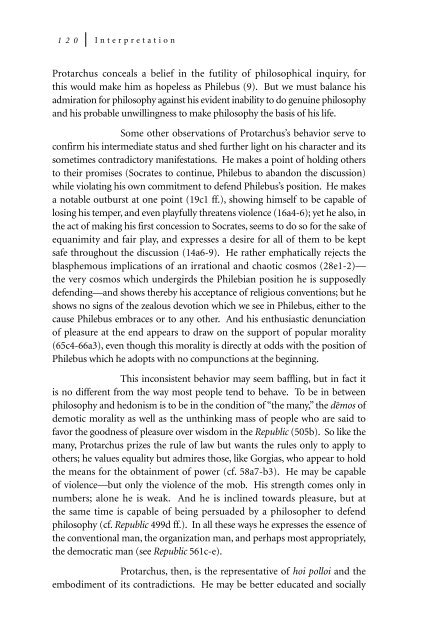Spring 2007 - Interpretation: A Journal of Political Philosophy
Spring 2007 - Interpretation: A Journal of Political Philosophy
Spring 2007 - Interpretation: A Journal of Political Philosophy
You also want an ePaper? Increase the reach of your titles
YUMPU automatically turns print PDFs into web optimized ePapers that Google loves.
1 2 0 I nterpretation<br />
Protarchus conceals a belief in the futility <strong>of</strong> philosophical inquiry, for<br />
this would make him as hopeless as Philebus (9). But we must balance his<br />
admiration for philosophy against his evident inability to do genuine philosophy<br />
and his probable unwillingness to make philosophy the basis <strong>of</strong> his life.<br />
Some other observations <strong>of</strong> Protarchus’s behavior serve to<br />
confirm his intermediate status and shed further light on his character and its<br />
sometimes contradictory manifestations. He makes a point <strong>of</strong> holding others<br />
to their promises (Socrates to continue, Philebus to abandon the discussion)<br />
while violating his own commitment to defend Philebus’s position. He makes<br />
a notable outburst at one point (19c1 ff.), showing himself to be capable <strong>of</strong><br />
losing his temper, and even playfully threatens violence (16a4-6); yet he also, in<br />
the act <strong>of</strong> making his first concession to Socrates, seems to do so for the sake <strong>of</strong><br />
equanimity and fair play, and expresses a desire for all <strong>of</strong> them to be kept<br />
safe throughout the discussion (14a6-9). He rather emphatically rejects the<br />
blasphemous implications <strong>of</strong> an irrational and chaotic cosmos (28e1-2)—<br />
the very cosmos which undergirds the Philebian position he is supposedly<br />
defending—and shows thereby his acceptance <strong>of</strong> religious conventions; but he<br />
shows no signs <strong>of</strong> the zealous devotion which we see in Philebus, either to the<br />
cause Philebus embraces or to any other. And his enthusiastic denunciation<br />
<strong>of</strong> pleasure at the end appears to draw on the support <strong>of</strong> popular morality<br />
(65c4-66a3), even though this morality is directly at odds with the position <strong>of</strong><br />
Philebus which he adopts with no compunctions at the beginning.<br />
This inconsistent behavior may seem baffling, but in fact it<br />
is no different from the way most people tend to behave. To be in between<br />
philosophy and hedonism is to be in the condition <strong>of</strong> “the many,” the de - mos <strong>of</strong><br />
demotic morality as well as the unthinking mass <strong>of</strong> people who are said to<br />
favor the goodness <strong>of</strong> pleasure over wisdom in the Republic (505b). So like the<br />
many, Protarchus prizes the rule <strong>of</strong> law but wants the rules only to apply to<br />
others; he values equality but admires those, like Gorgias, who appear to hold<br />
the means for the obtainment <strong>of</strong> power (cf. 58a7-b3). He may be capable<br />
<strong>of</strong> violence—but only the violence <strong>of</strong> the mob. His strength comes only in<br />
numbers; alone he is weak. And he is inclined towards pleasure, but at<br />
the same time is capable <strong>of</strong> being persuaded by a philosopher to defend<br />
philosophy (cf. Republic 499d ff.). In all these ways he expresses the essence <strong>of</strong><br />
the conventional man, the organization man, and perhaps most appropriately,<br />
the democratic man (see Republic 561c-e).<br />
Protarchus, then, is the representative <strong>of</strong> hoi polloi and the<br />
embodiment <strong>of</strong> its contradictions. He may be better educated and socially

















